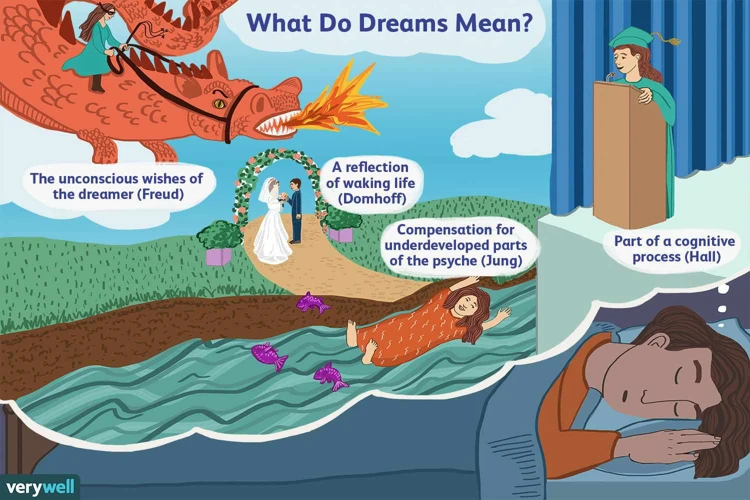Dreams have long been a source of fascination and wonder for human beings throughout history. From ancient civilizations to modern psychologists, people have tried to unravel the mysteries of dreams and understand their significance. While dreams may seem like a jumble of random images and experiences, they can actually hold deep meanings and insights into our unconscious minds. In this article, we will explore the secrets of dreams and how understanding them can help us gain valuable insights into our inner thoughts, emotions, and experiences. So, grab hold of your curiosity and join us on this journey of unlocking the hidden meanings of your dreams.
The Significance of Dreams

Dreams hold a profound significance in our lives, serving as a gateway to the depths of our unconscious mind. They are a reflection of our inner thoughts, emotions, and experiences that often remain hidden during our waking hours. As we drift into the realm of sleep, our minds become untethered, and we embark on incredible journeys through vivid landscapes. Our dreams can act as a mirror, revealing our deepest desires, fears, and unresolved conflicts. They speak a language unique to each individual, weaving together symbols, metaphors, and emotions that have the power to unlock the secrets of our subconscious. By delving into the realm of dreams, we can gain insight into our true selves and find answers to questions that often elude us in waking life. Dreams have been studied for centuries, ranging from Freud’s psychoanalytic interpretations to modern scientific research. So let us dive into this enigmatic realm, where we will explore the various ways dreams hold meaning and how we can begin to unravel their secrets.
1. Dreams as a Reflection of the Unconscious Mind
Dreams serve as a powerful reflection of our unconscious mind, offering a window into the hidden realms of our thoughts and emotions. When we dream, our minds are free from the constraints of conscious awareness, allowing repressed desires, fears, and memories to bubble to the surface. The symbols and imagery that manifest in our dreams can be thought of as a language of symbolism, conveying messages from the depths of our psyche. For example, a dream of flying may represent a desire for freedom and liberation, while a dream of falling could symbolize a loss of control or insecurity. By analyzing and interpreting the symbols within our dreams, we can gain insight into our deepest selves and the inner workings of our unconscious mind. Dreams provide a unique opportunity to explore the hidden recesses of our psyche and unlock the secrets that lie within.
2. Dreams as Messages from the Subconscious
Dreams act as powerful messengers from our subconscious mind, carrying hidden wisdom and insights that may elude us in our waking life. When we dream, our subconscious mind communicates with us through symbolic images, emotions, and narratives. These messages can provide valuable guidance, self-reflection, and even solutions to our problems. Each dream is unique to the individual, tailored to their personal experiences and emotions. By paying attention to recurring themes, symbols, and emotions in our dreams, we can begin to decipher the messages from our subconscious and gain a deeper understanding of ourselves. Exploring the depths of our dreams can unveil hidden truths, enhance self-awareness, and lead to personal growth. So, let us delve into the labyrinth of our dreams, where the mysterious language of the subconscious awaits our interpretation. What is the relationship between dreams and sexuality?
3. Dreams as a Way to Process Emotions and Experiences
Dreams serve as a powerful tool for processing and sorting through our emotions and experiences. When we dream, our subconscious mind takes center stage, allowing us to explore and make sense of the complexities of our inner world. Through dreams, we can experience a range of emotions, from joy and love to fear and sadness, as our unconscious mind processes and integrates our waking experiences. Dreams provide a space where we can confront unresolved issues, confront our fears, and gain a deeper understanding of ourselves. They offer a unique opportunity for emotional healing and growth, allowing us to release pent-up emotions, gain insights, and create a sense of balance within ourselves. So, pay attention to the emotions that arise in your dreams, for they may hold valuable clues to your emotional well-being and provide a pathway towards self-discovery and healing.
Understanding Dream Symbols

Dream symbols are the mysterious language of the subconscious mind, a code that holds the key to understanding the hidden messages within our dreams. These symbols can take on a multitude of forms, ranging from common archetypes to deeply personal images that hold significance to our individual experiences and beliefs. By decoding these symbols, we can gain valuable insights into our unconscious thoughts and desires. Common dream symbols, such as water representing emotions or flying symbolizing freedom, have universal meanings that can be found in various cultures and dream interpretation frameworks. However, personal dream symbols, specific to each individual, hold a more nuanced and personal significance. These symbols may be influenced by our unique experiences, relationships, and traumas. Unraveling the meaning behind these symbols requires introspection, reflection, and an open mind. So, let us embark on this fascinating journey of understanding dream symbols, unlocking the hidden messages that our subconscious mind wishes to communicate.
1. Common Dream Symbols and their Meanings
Dreams are filled with a multitude of symbols that hold specific meanings and interpretations. These symbols can be categorized as common dream symbols, which have shared meanings across cultures and individuals. For example, dreams featuring water may symbolize emotions and the subconscious mind, while dreaming of flying often represents a sense of freedom and liberation. Animals, such as snakes or birds, can symbolize various traits or emotions depending on the context. Understanding the meanings of these common dream symbols can provide valuable insights into the messages our dreams are trying to convey. By decoding these symbols, we can gain a deeper understanding of ourselves and delve into the hidden aspects of our unconscious mind.
2. Personal Dream Symbols and Interpretations
When it comes to personal dream symbols and interpretations, it is important to recognize that each individual’s dreams are unique and can hold deeply personal meanings. These symbols can vary greatly from person to person, as they are often shaped by our individual experiences, memories, and emotions. For example, a snake in one person’s dream may represent fear or danger, while for another person it may symbolize healing or transformation. To unlock the secrets of our personal dream symbols, one approach is to keep a dream journal and document recurring symbols and themes. By analyzing these patterns over time, we can begin to uncover the hidden messages that our subconscious is trying to convey. It is also helpful to reflect on the emotions and feelings that the symbols evoke, as they can provide valuable insights into their personal significance. Ultimately, exploring and interpreting personal dream symbols is a deeply introspective and individual process, requiring self-reflection and a willingness to dig deeper into the rich tapestry of our own minds.
Interpreting Different Types of Dreams

Dreams come in various forms and each type holds valuable insights into our subconscious mind. Recurring dreams, for example, are like persistent messengers from our inner selves, bringing attention to unresolved issues or emotions that need addressing. By recognizing and analyzing the patterns within these dreams, we can uncover hidden messages and gain a deeper understanding of ourselves. Lucid dreams, on the other hand, offer us the fascinating ability to become aware and take control within the dream state. Imagine manipulating the dream environment or engaging in experiences that would otherwise be impossible in waking life. Nightmares, although unsettling, can provide an opportunity for exploration and self-reflection. They often highlight our deepest fears and anxieties, giving us a chance to confront and overcome them. By interpreting and deciphering the meaning behind these different types of dreams, we unlock a treasure trove of self-discovery and personal growth. So, unravel the enigma of your dreams, whether they be recurring, lucid, or even nightmarish, and delve into the depths of your subconscious mind.
1. Recurring Dreams: Messages from Your Subconscious
Recurring dreams are a fascinating phenomenon that can hold valuable insights into our subconscious mind. These are dreams that you experience repeatedly, often with similar themes or elements. They serve as messages from your subconscious, attempting to convey important information or unresolved issues that need attention. Paying attention to these recurring dreams is crucial, as they can provide clues about patterns in your life, unresolved emotions, or recurring challenges that you may be facing. Exploring the symbolism and emotions within these dreams can offer a deeper understanding of your inner thoughts and help guide you towards personal growth and self-discovery.
2. Lucid Dreams: Taking Control of Your Dream World
Lucid dreams offer a fascinating experience where dreamers become aware that they are dreaming, allowing them to take control of their dream world. In such dreams, individuals can actively participate, manipulate the dream environment, and even alter the dream’s narrative. The ability to have lucid dreams can be cultivated through various techniques such as reality checks, dream journaling, and meditation. It opens up a realm of possibilities, where one can explore their creativity, overcome fears, and engage in adventures that surpass the limitations of the waking world. Lucid dreams can provide a powerful sense of empowerment and self-discovery, allowing individuals to tap into their subconscious and unlock hidden potentials. By practicing lucid dreaming, one can truly become the master of their own dream domain.
3. Nightmares: Exploring Your Fears and Anxieties
Nightmares are intense and distressing dreams that can leave us feeling fearful and anxious upon waking. When we experience nightmares, it is important to pay attention to the underlying fears and anxieties that they may represent. Nightmares often serve as a reflection of unresolved conflicts, past traumas, or current stressors in our lives. They provide a unique opportunity for us to confront and process these deep-seated emotions and fears. By analyzing the symbols and themes within our nightmares, we can gain valuable insights into our subconscious mind and the areas of our lives that may require attention or healing. These dreams may be an invitation to explore and address the root causes of our fears and anxieties, allowing us to move forward with a greater sense of peace and personal growth. It can be helpful to keep a dream journal or engage in dream analysis techniques to unpack the meaning behind our nightmares and gain a better understanding of ourselves.
Tools for Decoding Your Dreams

When it comes to decoding the mysteries of our dreams, there are several valuable tools at our disposal. One such tool is keeping a dream journal, a documentation of our dreams upon waking. By recording the details of our dreams, including the emotions, symbols, and events, we can begin to notice patterns and recurring themes. Another technique is dream analysis, which involves analyzing and interpreting the various elements of our dreams to uncover their deeper meanings. There are different methods of dream analysis, such as Freudian analysis or Jungian archetypes, which provide frameworks for understanding the symbolism within our dreams. Additionally, seeking the assistance of a professional dream interpreter or therapist can provide valuable insights and guidance. Ultimately, these tools help us to dive deeper into the rich tapestry of
Subscribe to Our Newsletter
Sign up to receive the latest news and updates.
1. Dream Journals: Documenting and Analyzing Your Dreams
Dream journals are an invaluable tool for unlocking the secrets of your dreams. Keeping a journal allows you to document your dreams as soon as you wake up, capturing the details and emotions before they fade away. By writing down your dreams, you create a permanent record that can be referenced and analyzed later. This practice helps you to identify patterns, recurring themes, and symbols that may hold personal significance. Analyzing your dream journal over time can reveal patterns and connections between your dreams and your waking life. It allows you to delve deeper into the meanings behind the symbols and experiences in your dreams, ultimately helping you to gain a better understanding of yourself and your subconscious mind. So grab a notebook, keep it by your bedside, and start documenting the world of your dreams.
2. Dream Analysis Techniques
Dream analysis techniques are valuable tools in deciphering the hidden messages within our dreams. These techniques involve various approaches to uncovering the meanings and symbolism embedded in our dream experiences. Some commonly used techniques include:
1. Journaling: Keeping a dream journal allows us to record our dreams immediately upon waking. By documenting our dreams in detail, we can identify patterns, recurring themes, and emotions that may offer insight into our subconscious mind.
2. Symbol interpretation: Analyzing the symbols present in our dreams can provide valuable information about our inner psyche. Symbols can have personal meanings or universal interpretations, and studying their significance can aid in understanding the underlying messages of our dreams.
3. Free association: When analyzing our dreams, free association involves spontaneously connecting ideas, images, and emotions that arise from our dream narratives. This technique helps uncover hidden associations and insights that may not be immediately apparent.
4. Guided imagery: Using guided imagery, we can revisit and explore specific dream scenes or symbols while in a relaxed state. This technique allows for a deeper exploration of the dream experience and can bring forth further clarity and understanding.
These dream analysis techniques, when applied diligently and consistently, can assist in unraveling the mysteries of our dreams and provide valuable insights into our inner world.
Common Dream Themes and Their Interpretations
Common dream themes often carry significant meanings and can provide valuable insights into our subconscious thoughts and emotions. One such theme is the sensation of falling, which is commonly associated with feelings of loss of control, insecurity, or a fear of failure. Dreams of flying, on the other hand, signify freedom, overcoming obstacles, and a sense of empowerment. Being chased in a dream may symbolize avoidance or a need to confront unresolved issues or fears. These interpretations may vary depending on the individual’s personal experiences and emotions. Dreams are highly personal, and understanding the unique symbolism within them can help uncover hidden truths and provide guidance on how to navigate our waking lives. By exploring these common themes and their interpretations, we can gain a deeper understanding of ourselves and the messages our dreams are trying to convey.
1. Falling: Loss of Control or Insecurity
– Falling in dreams often symbolizes a deep sense of loss of control or insecurity. It is a common dream theme that can indicate feelings of vulnerability or a fear of failure.
– This dream may reflect a lack of confidence in one’s abilities or a fear of being overwhelmed by a situation.
– Falling can also represent a fear of losing power or status, as well as a fear of making mistakes and facing the consequences.
– In some cases, this dream may be associated with a sense of being overwhelmed by life’s challenges or feeling unsupported in a particular situation.
– The falling sensation in dreams can evoke intense emotions such as anxiety, fear, or even excitement, depending on the individual’s personal experiences and emotions surrounding the theme of control and insecurity.
– It is essential to explore the context of the dream and personal experiences to understand the specific meaning and interpretation of falling dreams.
2. Flying: Freedom and Overcoming Obstacles
Flying in dreams is a captivating experience that often represents a symbol of freedom and the ability to overcome obstacles. When we dream of flying, it signifies a sense of liberation from the constraints of the physical world. It can symbolize breaking free from limitations, whether they are related to work, relationships, or personal challenges. Flying dreams can also indicate a desire for independence, adventure, and a need to explore new possibilities. This exhilarating sensation of soaring through the skies can ignite a sense of empowerment, reminding us that we have the strength and capability to overcome any hurdles that come our way. Embracing the symbolism of flying in our dreams can inspire us to confront challenges with determination and embrace the boundless opportunities that await us.
3. Being Chased: Avoidance or Confrontation
Being chased in a dream is a common and intense experience that often leaves us feeling frightened and anxious upon waking. This dream theme is often associated with a sense of avoidance or confrontation. When we dream of being chased, it can symbolize our desire to avoid a certain situation or person in our waking life. It may indicate unresolved conflicts or the fear of facing difficult emotions or challenges. Alternatively, being chased can also represent a need to confront our fears head-on and overcome obstacles that may be hindering our progress. When interpreting this dream, it is essential to consider the specific context and emotions involved in order to gain a deeper understanding of the messages our subconscious mind is trying to convey.
Conclusion
In conclusion, dreams are a powerful and intricate part of our human experience. They provide a window into the depths of our unconscious mind, offering insights into our thoughts, emotions, and experiences that may otherwise go unnoticed. By understanding and interpreting our dreams, we can gain a deeper understanding of ourselves and navigate through life with greater clarity and awareness. Whether it’s deciphering dream symbols, exploring different types of dreams, or utilizing tools like dream journals and analysis techniques, we have the ability to unlock the secrets that lie within our dreams. So, embrace the mystical world of dreams and embark on a journey of self-discovery and enlightenment. Dreams are a gift that we can use to enrich our lives and uncover the hidden wisdom that resides within us all.
Frequently Asked Questions
1. What does it mean if I dream about teeth falling out?
Dreams about teeth falling out are commonly associated with feelings of insecurity, vulnerability, or a fear of losing control. They can also symbolize concerns about appearance or communication issues. Exploring the specific details and emotions in the dream can provide further insights into its meaning.
2. Can dreams predict the future?
While dreams can sometimes seem prophetic, there is no scientific evidence to support the claim that they can predict the future. However, dreams can offer valuable insights into our current thoughts, emotions, and experiences, which can help guide our actions and decisions in waking life.
3. Why do I have recurring dreams?
Recurring dreams often indicate unresolved issues or recurring patterns in our lives. They can be our mind’s way of trying to bring attention to something that needs addressing. Paying attention to the themes and emotions in recurring dreams can assist in identifying and resolving underlying issues.
4. What causes nightmares?
Nightmares can have various causes including stress, anxiety, trauma, medication, or even certain foods. They often reflect our deepest fears and anxieties, providing an opportunity for us to confront and process these emotions. Engaging in relaxation techniques and creating a soothing bedtime routine can help reduce the frequency of nightmares.
5. How do I start keeping a dream journal?
To start a dream journal, keep a notebook or use a smartphone app next to your bed. As soon as you wake up, write down any dream details that you remember, including emotions, characters, and settings. Regularly documenting your dreams will help you better understand patterns and recurring symbols.
6. Are there universal dream symbols?
While some symbols may have commonly accepted meanings, such as falling representing loss of control, dream symbols can also be highly personal and unique to each individual. It’s important to consider personal associations and emotions linked to symbols when interpreting dreams.
7. Can I learn to have lucid dreams?
Yes, it is possible to learn to have lucid dreams, where you become aware that you are dreaming and can control the dream’s outcome. Techniques such as reality checks, keeping a dream journal, and practicing mindfulness can increase your chances of having lucid dreams.
8. Do animals dream?
Research suggests that animals, especially mammals and birds, do experience some form of dreaming. They exhibit REM (rapid eye movement) sleep, which is when most dreams occur in humans. While we can’t be certain of the content of their dreams, observations indicate that they engage in similar behaviors as humans when dreaming.
9. Are there any negative effects of interpreting dreams?
Interpreting dreams can be a powerful tool for self-reflection and personal growth. However, it’s important to approach dream interpretation with a balanced mindset. Over-analyzing dreams or relying solely on dream meanings can lead to unnecessary anxiety or distorted perceptions of reality.
10. Can dreams provide creative inspiration?
Absolutely! Dreams have served as a wellspring of inspiration for artists, writers, and inventors throughout history. Many creative breakthroughs and inventions can be traced back to ideas and images that originated in dreams. Paying attention to the symbols and narratives in your dreams can unlock your creative potential.










